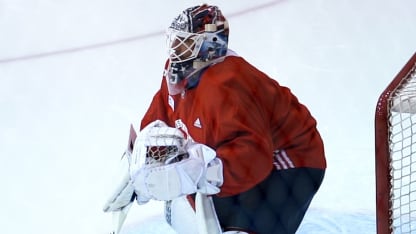In an interview with the NHL Network last week, Lundqvist said he wanted to play in the NHL again and get another shot at winning the Stanley Cup. He came closest when he reached the 2014 Stanley Cup Final with the New York Rangers before losing to the Los Angeles Kings in five games.
"I love it. I want to compete, and it's going to come down to testing and conversations with the doctors," Lundqvist said. "It's coming up, so we're getting close to that point. And until then, I just keep grinding, and then we'll see what happens."
Lundqvist signed a one-year, $1.5 million contract with the Capitals on Oct. 9 after he had the final season of his contract bought out by the Rangers on Sept. 30. After 15 seasons with New York, Lundqvist, whose 459 wins are sixth in NHL history (459-310-96), was expected to compete for Washington's starting goalie job in training camp until he received the news in mid-December that he needed to have a heart valve replaced.
"A routine physical that was an early physical turned into, 'Well, we need to explore further what's going on with you,'" Capitals general manager Brian MacLellan said Dec. 23. "Following along, our trainer, Jason Serbus, did an unbelievable job. Our doctors, the cardiologists, the specialists, it kept getting deeper and deeper. As we went that far, Henrik got a lot more knowledge of what his situation is and where it's going and what his risk levels are … and his risk level is not acceptable for him to continue to play, for him and his family."
Lundqvist announced Dec. 17 on Twitter that he wouldn't be able to play this season because of a heart condition.
"I'd been aware of a heart condition for 15 years that I had a leaky valve and at some point it needed to be fixed, but over the course a few months things changed and the leak got worse and my aorta started to get too big and the pressure in the heart was too high," Lundqvist told NHL Network. "But all along, I was like, 'This is going to work. We're going to make it work.' … And I get the call from one of the specialists that it was part of the process and it's like, 'I'm sorry, but your tests came back worse than we thought.'"

